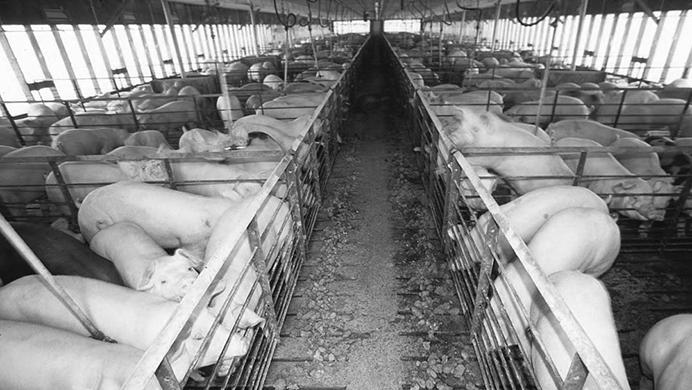The large amount of direct foreign investment in Iowa’s pork industry should be just as alarming as unclean water and bad smells.
By Dan Williams
As colleague Zach Weigel pointed out last week, Iowa’s pork industry is Iowa’s most important industry. To give an idea of the relative size, the state’s pork industry is three times as productive as the No. 2 pork-producing state, Illinois. Almost one-third of U.S. hogs are raised in Iowa.
Weigel astutely identified some external costs of mass production. They include the familiar odor of feces wafting through the air and the blood-curdling squeals of intelligent animals who know they are about to be killed.
But these are aesthetic concerns that the majority, I think, would stomach, given the billions of dollars and thousands of jobs the industry provides.
There is one dimension to the pork industry that Weigel did not address, and that is foreign direct investment. Weigel ends by saying that public goods, like water quality, need to be adequately protected. But it’s an open secret that Big Money has Big Influence on politics — especially important local races in which $100,000 can go a long way. We should all be aware of where the money is at in the pork industry.
RELATED: Weigel: Public interest must be favored over pork mills
Foreign direct investment is when a company owns a business in another country. It’s a deceptively simple definition, as anyone who looks into global trade and finance will know. Such investment is relevant to Iowa because the state is such a powerhouse in agriculture and manufacturing. States have been courting foreign investment because it brings in jobs: Think of it as sort of the reverse of outsourcing. In the globalized economy, foreign direct investment is increasingly important for economic growth; the recent Russia sanctions are aimed at stalling foreign investment in the country.
The largest U.S. pork producer was bought by a Chinese corporation in 2013. Smithfield Foods, based in Virginia, was purchased for $4.7 billion by the Shuanghui Group, which changed its name to the WH Group after the acquisition. Smithfield operates eight meat plants in Iowa and employs just under 4,000. The company agreed to the deal not only because Shuanghui offered 31 percent above its market price but also because U.S. pork consumption has been decreasing for years. Chinese pork consumption, however, has exploded. A good deal of Iowa pigs will end up in Chinese stomachs.
All this is well and good — for business. What’s the catch? The catch is that now there is another very large, foreign corporate entity with its eyes on Iowa. I will not go so far as Richard Manning, who wrote, “What Smithfield sold the Chinese was less its pork production than its control of Iowa’s politics and its landscape.” But I will say that we ought to keep a watchful eye on our politicians to make sure that they really are serving the public good and not another corporate interest. All that money being created by all that trade ought to come back to the community through better schools and better water.
We know that capitalism is good at creating money. But we also know that unrestrained capitalism produces undesirable social and environmental ills. Iowa remains attractive for foreign investment not just because of our favorable corporate tax climate (incidentally, a large reason our public coffers are empty), but also because the people are nice and hard-working (for the most part) and because we have high standards for public education and health, in addition to low costs of living. It’s a dream state for many.
Don’t let Iowa turn into a dump for an ideological crusade. Keep up the fight for clean water.



